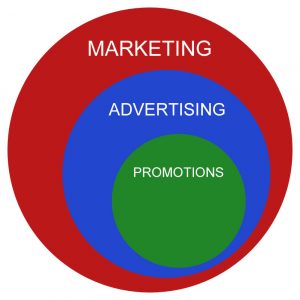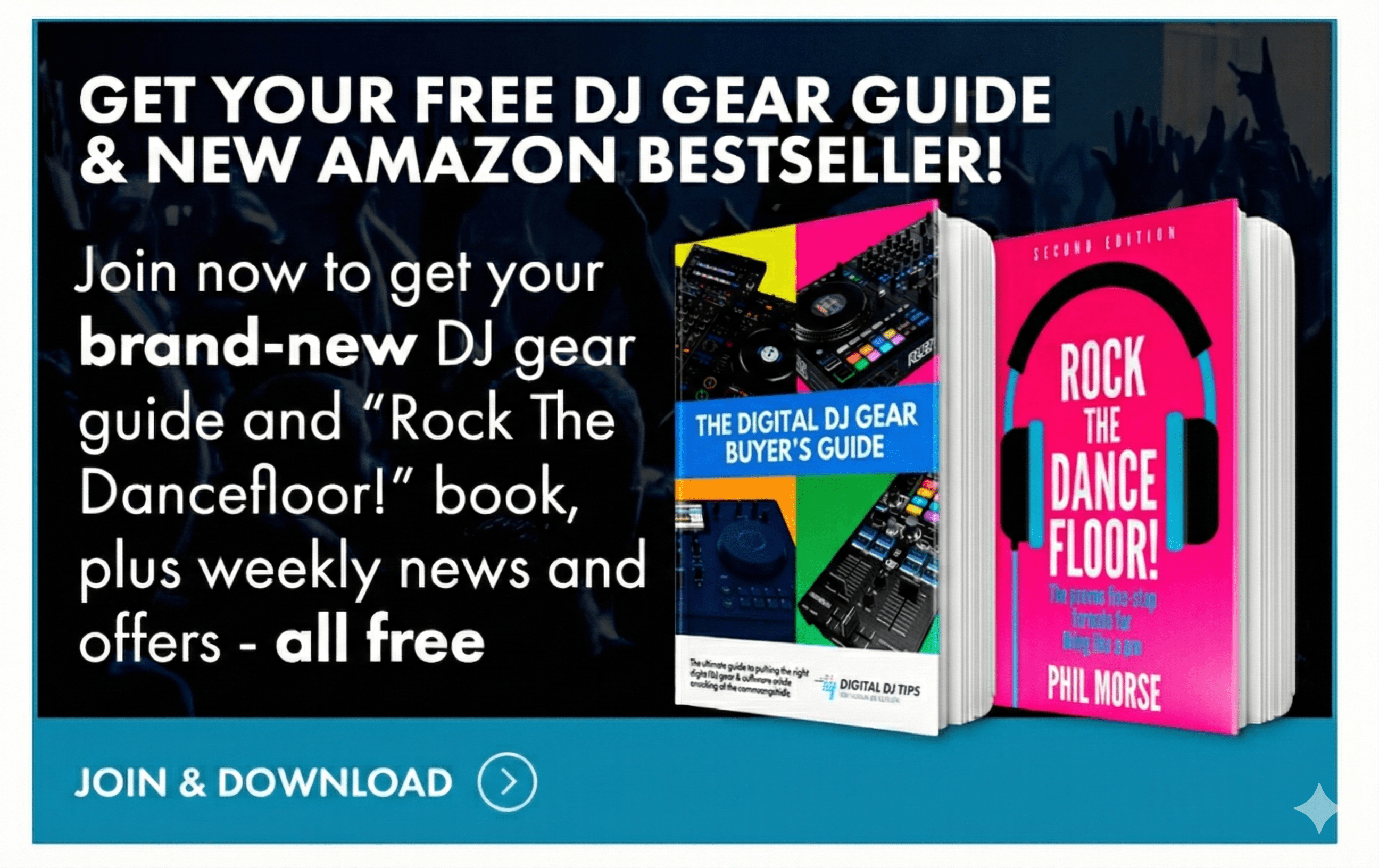
Over the course of the last six articles in this series, I’ve pretty much hit you with the harsh reality of working in this industry, and some of those sociological and time management “musts” one has to accept in order to succeed as a DJ.
Now we’re changing gears from the “hard truths” and going deep into building your business empire, regardless of which bucket or buckets of DJing you consider yourself to be in. We’re going to learn what real marketing is and how you can and should use this information to promote your DJ enterprise.
Marketing vs advertising vs promotions
When you think of the term “marketing”, what comes to mind? Do you think it’s all handing out flyers or CDs? Spamming email and social networks? Making business cards? The answer is “all of the above… and a whole lot more”. When you really look at what marketing, advertising, and promotions are, you have to imagine these terms as three circles, with each becoming a larger part of another:
Promotion is really what I described earlier. It’s the act of pushing or basically promoting an event, mix, track, etc. Generally this is applied to a specific product. When you’re spamming email and social media to tell people you’re playing at a club on Friday, that’s promotion. When you hit up DJs to check out (and hopefully purchase) a track you produced and are selling on Beatport, that’s promotion.

Advertising is a larger “whole” of promotion. The idea isn’t so much a specific item or event, but a brand, a name, a company. When you see ads of happy people all drinking the different varieties of Coca-Cola (but no specific Coke product highlighted), it’s advertising. The goal isn’t to make you buy a Diet Coke or a Cherry Coke, but to be aware of Coca-Cola as a whole whenever you feel thirsty.
Bigger name DJs nowadays have whole advertising campaigns about them. Look at Armin Van Buuren. You get his advertisement whenever you see his logo, hear his mixes, see podcasts of new tunes from his Armada label, etc. The goal is to make you see “Armin Van Buuren” as a brand name synonymous with energetic trance and large-scale events. You merely think of his name and you know what he’s about and what he’s selling.
I don’t know if a lot of DJs really go this deep into it all, but if you look at very successful promoters, they live for this. They want a massive crowd in their events, and they want to know exactly what consumers want and how to make money off that. Mobile DJs also can gain a lot with true marketing.
Building a Brand
I mentioned “brand” back in my description of advertising. When one hears of “branding”, one might think it’s just about a logo, but it’s more the entire image and message a company sends out. Think of Apple and you think “expensive”, “innovative”, “high-end” and “consumer-friendly”. Look at DJ equipment companies like Gemini or American DJ. Usually their brand image is of inexpensive, but low-end gear. Even if those companies did not want that image, they’ve got it. It shows that if you as a DJ make a bad impression on your consumers, then it’ll hurt your overall brand image. This is why Cajmere will never just go out and play a Green Velvet set as “Cajmere”. Now part of building a brand is a logo, and it’s one thing I urge any DJ of any “bucket” to look into. You spent enough time deciding on your DJ name, and that is part of what you’re trying to sell. Your logo is part of your brand image. Like I mentioned before in an example of a Jersey-Shore-Ed-Hardy clothed guy not fitting in at a dubstep event, your logo should also meld into what you see as your brand image.

The image here is my name in eight different variations, based on actual logos I’ve seen out there. Logo #1 is a copy of how Armin Van Buuren does his logo. When you first saw it, did you think “trance DJ”? Or maybe “hip-hop DJ”, since it seems similar to Run DMC’s old logo. I’m sure if my name was “Dee Van Jam” it would say “trance DJ”. Logos 2 and 3 could be construed as possibly as “hip-hop”, based on how they look like they could be graffiti tags. #2 is actually a font Fatboy Slim uses, thus showing how he might not have come off as “breaks/big beat” had he not gotten famous first.
Look at Logos 4 and 7. What kinds of music do you think I would play in those brands? Electro-house perhaps? You notice how they carry that 80s vibe many of the electro house acts have been playing with. Logo #5 is more a “typical” logo I see mobile DJs use. In many ways I would assume that image is of a mobile/wedding DJ. You might think it’s not up to much, but imagine if a bride-to-be saw the other seven logos, would she think “that’s the DJ for my wedding”?
How about #6? Goth perhaps? It was made using a font the metal band Slipknot uses. Definitely not the image one wants if they were a party DJ. Logo #8 is my actual logo that I’m implementing into my new site design. Notice how it seems unassuming. I did that on purpose because I didn’t want anyone assuming what kind of a DJ I am based on it. I wanted something simple that could place nicely and boldy on a flyer, but yet sit in any colour and still say the same. If I wanted to be a genre-specific DJ, then I wouldn’t have gone this route, but since I like playing different genres, it fits.
Your logo and even physical image (hair, outfit and so on) are all part of your branding. Your sound is also a big part of your brand, as well as talent on the decks and personality. In the music business, branding is a big deal now, since we see so many pop stars and now pop DJs who have so much more about them than just how they sound.
What is your market?
The first and foremost rule of marketing yourself as a brand is to determine the people you want to shoot for. You can’t just say “everyone”, because it doesn’t work that way. Everyone is different. Some aim at people doing weddings, some aim at corporate event planners, some aim at young 20-somethings who want to be fake and go clubbing, some aim at the 20-somethings who aren’t into the glam thing and want something more underground, some aim at teens, some push on women more than men.
In my DJing, I’ve been aiming at lot at mid-20s to 40-somethings who aren’t closed-minded, but aren’t deeply into the EDM and club thing. My mixes and brand are generally aimed at introducing people to electronic music, at showing there’s a big realm of music outside of MTV and the radio. When you’re determining your target market, you should keep in mind on how you can possibly get average people into you as a DJ. Imagine in your town you have a pool of 5,000 people who go out every weekend, but only 1,000 of them are diehard clubbers. If you end up with a load of DJs and promoters all pushing to get that 1000 people, but the other 4000 never come to any of the spots… then you’re missing the big picture.
So maybe DJ Danny Douchebag can get 700 of those 1000 to his glam night, but you swoop in and get 3,000 of those 4,000 into the event you throw. Who do you think will get more bookings down the road?
What is your message?
When I once was designing a website for a client, my creative director kept pushing my copywriter and me to come up with an underlying message. It was a hard lesson with an all-nighter in the office, but I learned it, and think about it every time I try to do any kind of marketing, even DJing. Let me show you a time when I got this totally wrong. My colleague and I attempted to do a laid-back fun Wednesday night weekly event with house music as the main sound. So imagine two DJs are trying to push a relaxed “come as you are” kind of night with inexpensive drinks and good music… but you see this flyer:

Without even reading the flyer, what’s your impression? You might see the colours and the model, and instantly think it’s some expensive club with bottle service. If you can even read the copy, I was completely off and made basically a promotion for a glam club as opposed to a local bar with two DJs pumping house music. Is it any wonder the night failed? What is the message when you see a flyer for Tiesto? The answer is: Americans going to this event will get a splash and taste of what those big European trance events are like. For one night take yourself to Belgium or somewhere like that and imagine you’re at a gigantic 10,000-person event.
Your message is about “what you are selling” as a whole. Back in the 80s when Danny Rampling had his Shoom events, he was selling Ibiza in London. Yes you had to get “sorted” (high) to get into the Ibiza frame of mind, but it’s why people flocked to his sweaty cramped venue and acid music.
The most successful DJs and promoters are the ones who sell a consistent lifestyle that people want a part of. You go to a Daft Punk event partially for the music, but also the visual show and big space. You go to see Miguel Migs play at the small lounge club because you want a fashionable, but un-cheesy cool hip experience.
Think this way when you sell yourself. Think of your market and then a message to send to them.
Make sure it’s clear and easy
Is your message clean and simple enough to understand? You saw my mistake with the glam club flyer for a laid-back night. I’ve also messed up presentations of events, mixes, and online shows because I got too complex with my message. However, I’ve also seen it happen the other way around. How clean and clear is this message if you saw it on Twitter?
djjoeyjockstrap.com/mixes DO IT BITCHES!
What does that tell me? What does it tell anyone? Why should I even care?
Make sure you have the right message that people want to hear and will respond to. It’s like selling drugs. You give them a taste and build up their trust and faith in you, then you can sell them almost anything. It’s how some locals can just post where they’re playing and everyone goes out, while others fail.
For mobile DJs, it’s the same thing. Think about the market and who you want to get your message, and how you want it to appear. If brides see imagery of fun happy wild unforgettable weddings, then it’s a bonus. In this example you’ll want to make your entire brand about fulfilling the fantasies of these women who want that picture-perfect unforgettable event.
Next week we’ll look at networking your way to DJ success.
• D-Jam is a Chicago nightclub and rave DJ by night, and a branding expert by day. Check out his website
Check out the other parts in this series:
- How To Succeed At DJing, Part 1: What Type Of DJ Do You Want To Be?
- How To Succeed at DJing, Part 2: Play the Popularity Game
- How To Succeed at DJing, Part 3: Get Involved in Your Local Scene
- How To Succeed at DJing, Part 4: Join an Entertainment Firm or Promotion Crew
- How To Succeed at DJing, Part 5: Make it a Full-time Effort
- How To Succeed at DJing, Part 6: Accept This Is the Music Industry
- How To Succeed at DJing, Part 8: “You Only Get What You Give”
- How To Succeed at DJing, Part 9: Get a Demo & Press Kit
- How To Succeed at DJing, Part 10: Hit the Street
- How To Succeed at DJing, Part 11: Promote Yourself Online
- How To Succeed at DJing, Part 12: Build Yourself a Website
- How To Succeed at DJing, Part 13: Think Beyond Gigs
Have you ever thought about marketing yourself? Or have you only been promoting yourself? What do you think you will change in your game plan now?








